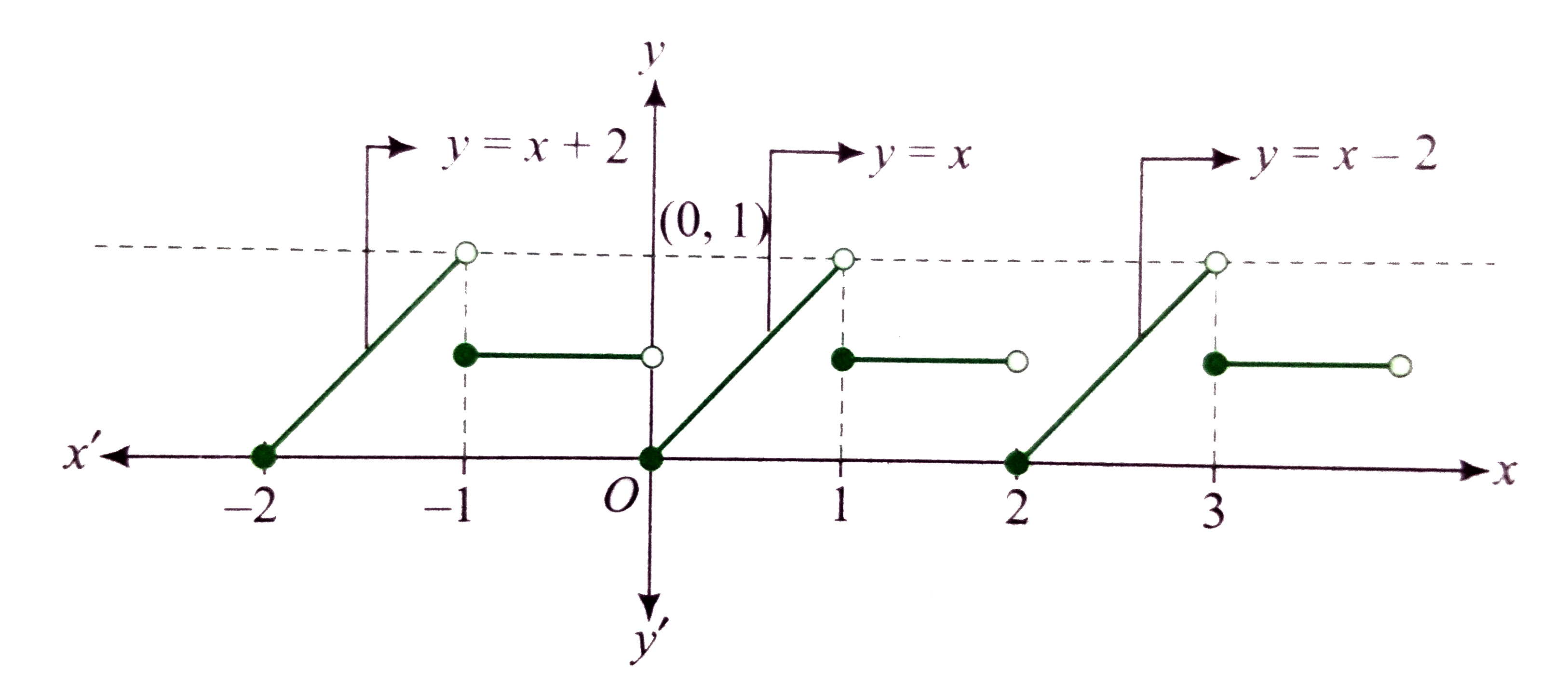Which of the following function is/are periodic?
A
f(x)={1,x is rational0,x is irrational
B
f(x)={x−[x],2n≤x<2n+112,2n+1≤x<2n+2
where [.] denotes the greatest integer function n∈Z
C
f(x)=(−1)[2xπ], where [.] denotes the greatest integer function
D
f(x)=x−[x+3]+tan(πx2), where [.] denotes the greatest integer function, and a is a rational number
Video Solution
Text Solution
The correct Answer is:A, B, C, D
f(x)={1,x is rational0,x is irrational
orf(x+k)={1,x+k is rational0,x+k is irrational, where k is any rational number
={1,x is rational0,x is irrational
=f(x)
Therefore, f(x) is periodic function, but its fundamental period cannot be determined. Thus,
f(x)={x−[x],2n≤x<2n+11/2,2n+1≤x<2n+2
Draw the graph from which it can be verified that period is 2.

f(x)=(−1)[2xπ]
orf(x+π)=(−1)[2(π+x)π]=(−1)[2xπ]+2=(−1)[2xπ]
Hence, the period is π.
f(x)=x−[x+3]+tan(πx2)={x}−3+tan(πx2)
{x} is periodic with period 1,tan(πx2)x is period with period 2.
Now, the LCM of 1 and 2 is 2. Hence, the period of f(x) is 2.
|
Topper's Solved these Questions
- RELATIONS AND FUNCTIONSBook:CENGAGEChapter:RELATIONS AND FUNCTIONSExercise:Exercise (Comprehension)
Explore 32 Videos
- RELATIONS AND FUNCTIONSBook:CENGAGEChapter:RELATIONS AND FUNCTIONSExercise:Exercise (Matrix)
Explore 9 Videos
- RELATIONS AND FUNCTIONSBook:CENGAGEChapter:RELATIONS AND FUNCTIONSExercise:Exercise (Single)
Explore 125 Videos
- Quadratic Equations, Inequalities, Modulus and LogarithmsBook:CENGAGEChapter:Quadratic Equations, Inequalities, Modulus and LogarithmsExercise:Question Bank
Explore 31 Videos
- SCALER TRIPLE PRODUCTS Book:CENGAGEChapter:SCALER TRIPLE PRODUCTS Exercise:DPP 2.3
Explore 11 Videos
Similar Questions
Knowledge Check
Which of the following functions is periodic ?
Af(x)=x+sinxBf(x)=cos√xCf(x)=cosx2Df(x)=cos2xWhich of the following function is periodic ?
Asgn(e−x)x>0B|sinx|+sinxCmin(4cosx,|x|)D[x+12]+[x−12]+2[−x], [.] represents greatest integral functionWhich of the following functions is non-periodic?
Af(x)=tan(3x−2)Bf(x)={x}, (where {.} denotes the fractional part of x)Cf(x)=x+cosxDf(x)=1−cos2x1+tanx−sin2x1+cotx
Which of the following functions are periodic? f(x)={|sgn(x)|,x≠01,x=0
View SolutionWhich of the following functions are periodic -- (1) sinx+cosx (2) cosx+{xπ} (3) cosπx+{2x} (4) In {x}+sin2x
View SolutionWhich one of the following functions are periodic
View SolutionWhich of the following functions is periodic with period π ?
View SolutionWhich of the following function is periodic with fundamental period π?
View Solution
